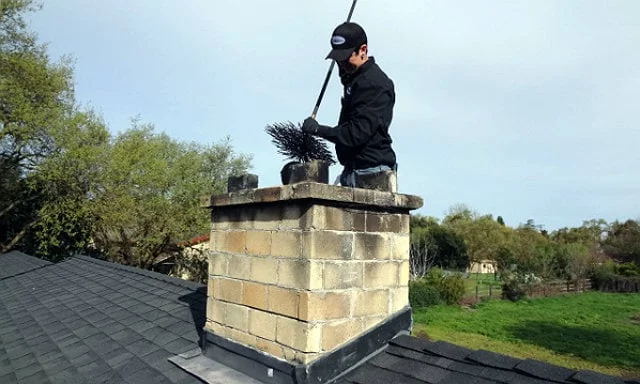Knowing if an animal has entered your chimney is critical to keeping your home safe and functional. Chimneys are attractive to birds, squirrels, raccoons, and even bats because they provide shelter and warmth. When an animal gets trapped, it can block airflow, cause odors, and create health and safety hazards. If left unresolved, a live or dead Animal Stuck in Chimney can result in costly repairs and potential risks to your family’s well-being. That’s why it is important to identify the warning signs and act quickly.
Why Does It Matter If There’s an Animal in Your Chimney?
Why should you care about an animal inside your chimney? A trapped raccoon, squirrel, or bird can block ventilation, causing smoke and dangerous gases to back into your house through the fireplace. Odors from a dead animal may spread throughout the home, while nests increase the risk of fire. Professionals emphasize that early removal ensures safety and prevents long-term damage. According to one expert, “Animals inside chimneys pose both a safety risk and a sanitation issue—timely inspection and removal are essential for every homeowner.”
What Are the Common Problems Caused by Animals?
What issues can arise when animals or birds enter a chimney? Commonly, homeowners report scratching noises in chimney at night, especially when raccoons or squirrels are present. You may also hear sounds like chirping from birds or squeaking from mice. Another problem is a smell caused by droppings, nesting materials, or when animals die inside. A dead raccoon, squirrel, or bird can attract pests like flies and maggots. Over time, nests block airflow, which can cause carbon monoxide buildup inside the house. Even bats may try to come down chimneys, creating noise and health concerns.
What Are the Key Benefits of Detecting an Animal Early?
Why should you identify animal activity quickly? First, early detection lowers the cost to remove dead animal from chimney, since it’s easier to handle live animals before they become trapped. Second, it helps prevent structural damage to flue liners and dampers. Third, it keeps your home safe from unpleasant smells and infestations. Finally, professional chimney sweep services can clean nests and debris, reducing fire hazards and ensuring the fireplace works efficiently. By acting early, you save money, protect your home, and ensure humane removal of the animal.
What Is the Cost Breakdown of Animal Removal and Chimney Cleaning?
How much does it cost to resolve these problems? The cost to remove dead animal from chimney usually ranges between $200 and $600, depending on the animal type and accessibility. For example, removing a raccoon or squirrels often requires special equipment, while a bird or mice may be less expensive. If animals are stuck in the wall near the chimney, removal can cost more. A follow-up Chimney Cleaning service ranges from $150 to $300, ensuring nests, droppings, and odors are eliminated. While these costs add up, they are far lower than repairing structural damage or dealing with long-term infestations.
What Are the Key Features of a Professional Chimney Inspection?
What does a professional chimney sweep do during an inspection? First, they use cameras and tools to locate trapped animals or nesting materials. Second, they check the chimney cap to see how animals gained entry. Third, professionals safely trap and remove live animals such as squirrels, raccoons, bats, or even the occasional cat. Fourth, they sanitize the area to eliminate bacteria and lingering smells. Lastly, they may recommend installing a protective cap to keep future birds, racoons, or other pests out. For homeowners in areas like Charlotte, NC, and beyond, hiring experts helps you quickly get rid of wildlife issues.
FAQs
How can I tell if something is in my chimney?
You may hear sounds like scratching, chirping, or fluttering. Strong odors or unusual smoke patterns also suggest an animal or nest is blocking airflow.
Do bats come down chimneys?
Yes, bats often come into chimneys at night to roost. If they get stuck, professional removal is necessary.
What happens if an animal dies inside the chimney?
A dead animal will cause a foul smell and may attract insects or other pests. You should call a removal specialist immediately.
Can I remove animals myself?
DIY methods are not recommended. Improper removal can harm animals, damage the chimney, or spread disease. Always rely on professional technicians or wildlife experts.
How can I prevent animals from getting inside?
Installing a chimney cap is the best way to rid your chimney of future issues. It blocks entry points while allowing smoke to escape safely.
Conclusion
What steps should you take if you suspect animals in your chimney? Recognize the warning signs, such as scratching noises in chimney at night, unpleasant smells, or unusual sounds. Whether you are dealing with bats, birds, raccoons, squirrels, or mice, the best action is to call a professional for safe removal. The cost to remove dead animal from chimney is always worth preventing long-term structural damage, fire hazards, and health risks. For homeowners everywhere, from Charlotte, NC, to larger cities, investing in regular chimney sweep services and protective caps provides lasting peace of mind. Ensuring your chimney is free of animals is not just about convenience—it’s about protecting your house, keeping your fireplace safe, and avoiding costly repairs. Detecting and addressing an animal stuck in chimney early is the most reliable way to keep your home secure and comfortable.
Read More: Chimney Sweep Baltimore


